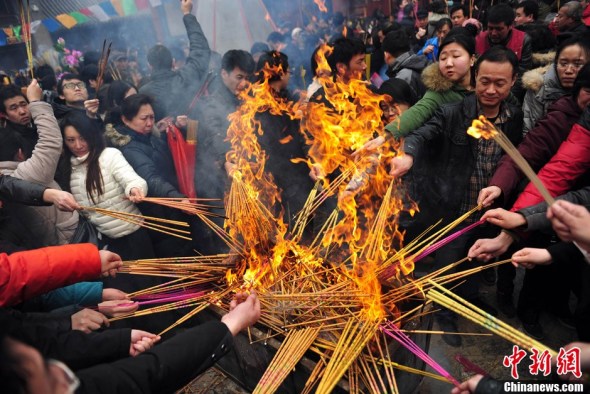

File photo shows visitors burn joss sticks in a temple. (Photo: chinanews.cn)
Religious groups in China on Wednesday called for temple visitors to burn less joss sticks during Spring Festival, as excessive incense sticks burning has contributed to worsening air quality.
Addressing a news conference, spokesmen for the Buddhist Association of China and the Chinese Taoist Association said the practice of burning a large amount of joss sticks is irrational and affects air quality.
In Chinese tradition, burning joss sticks in temples is a ritual to pray for blessings. In recent years, as the Chinese get richer, more people choose to burn incense sticks in temples to pray for a better life during traditional holidays. In some cases, they burned hundreds of dollars of incense sticks.
According to Hu Xuefeng, the host of the Yonghegong Lama Temple, a popular religious destination in Beijing, a crowd of nearly 100,000 people went to the temple to burn incense sticks on the first day of the lunar calendar last year.
Hu said it is unnecessary and irrational for the public to rush to the temples and burn a lot of incense sticks to seek blessings on the first day of the lunar calendar year.
"In fact, three sticks at a time is absolutely enough to show their sincerity," Hu said.
According to Ming Jie, spokesman for the Buddhist Association of China, the way that people burn as much incense sticks as possible deteriorates air quality and poses a fire risk.
"People sometimes misunderstand the meaning of burning joss sticks and tend to equal the blessings with the number and weight of the incense sticks they burn," Ming said.
In a bid to improve the temple environment, the Yonghegong Lama Temple initiated measures to deal with the air pollution caused by irrational burning of incense sticks in December, including presenting visitors with free joss sticks.
"Since the adoption of such measures, the number of joss sticks burned per day has greatly dropped, and we have seen an obvious improvement of the air quality in the temple," Hu said.
According to Hu, previously, the temple will collect two trucks of the burnt dust of the incense sticks a day before they offered free ones.
Moreover, the free sticks offered by the temple are higher quality than those brought by visitors, Hu said.
According to Hu, the amount of dust produced by poor-quality joss sticks well exceeds those generated by high-quality ones.
"By burning high-quality incense sticks, the temple has resumed a solemn and dust-free environment for visitors," he added.
China's missing ancestors finally honored in New Zealand
2013-05-10Circle of life in Barkhor street
2012-10-26Religion lost in contracting system
2012-01-10Copyright ©1999-2018
Chinanews.com. All rights reserved.
Reproduction in whole or in part without permission is prohibited.